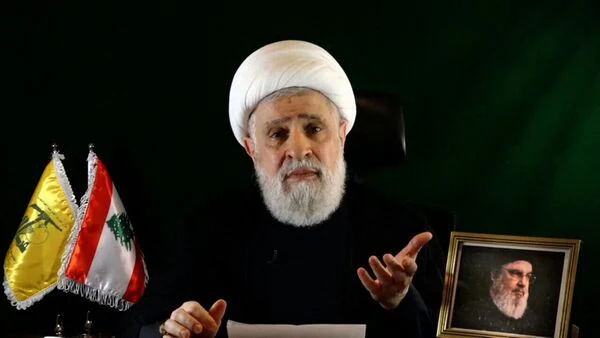In a startling development that could reshape the balance of power in the ongoing Israel-Hamas war, Hezbollah’s second-in-command, Naim Qassem, has reportedly fled Lebanon for Iran, fearing an assassination attempt by Israel. According to UAE-based Erem News, Qassem left Beirut on October 5 aboard an aircraft used by Iran’s Foreign Minister Abbas Araghchi during a diplomatic visit to Lebanon and Syria. The decision was allegedly made by top Iranian leaders, citing growing concerns over his safety as Israeli forces continue targeting key Hezbollah figures.
This unexpected move highlights the intensity of the current conflict, raising questions about the impact of Qassem’s departure on Hezbollah’s operations, Iran’s involvement, and Israel’s strategy. The development also signals a critical moment in the Israel-Iran-Hezbollah triangle, with wide-reaching implications.

A High-Stakes Evacuation of Qassem Amid Escalating Tensions
Naim Qassem, a founding member of Hezbollah and the organization’s deputy secretary general, has been a prominent figure in Lebanon’s political landscape since the group’s formation in the 1980s. His departure from Beirut, as per the *Erem News* report, came after the assassination of Hezbollah’s leader Hassan Nasrallah on September 27, a blow that has visibly shaken the militant organization. Since Nasrallah’s death, Qassem took a more public role, delivering several speeches—one from Beirut and two from Tehran—urging resistance against Israeli forces.
The report suggests that Israeli intelligence has intensified its focus on Hezbollah’s leadership, targeting those at the top of its hierarchy. The growing threat prompted Iranian leaders to orchestrate Qassem’s transfer out of Beirut to prevent another high-profile assassination. His fleeing represents not just a personal retreat but could mark a strategic shift in how Hezbollah and its backers in Iran are approaching the rapidly evolving conflict with Israel.
Implications of Qassem ‘s flee for Hezbollah and Iran’s Role in the Conflict
Qassem’s escape to Iran raises several key questions about the future of Hezbollah’s operations in Lebanon. While his absence from the ground may cause a temporary leadership vacuum, it is unlikely to dampen the group’s activities entirely. Hezbollah, with its deep-rooted network and ideological commitment, remains a formidable force in Lebanon and a proxy for Iran’s broader ambitions in the Middle East. However, Qassem’s departure is an undeniable setback, symbolically weakening Hezbollah’s presence in the eyes of both supporters and adversaries.
For Iran, the decision to shield Qassem from potential Israeli assassination attempts highlights the importance of preserving its key allies in the region. Iran’s Revolutionary Guards were instrumental in the formation of Hezbollah following Israel’s 1982 invasion of Lebanon, and Tehran remains one of the group’s main financial and military backers. By facilitating Qassem’s escape, Iran is likely positioning him for a continued role in shaping Hezbollah’s strategy, albeit from a safer distance.
This move also underscores Iran’s strategic calculations in the ongoing war. By safeguarding high-ranking figures like Qassem, Iran ensures that Hezbollah’s leadership remains intact while avoiding direct confrontation with Israeli forces. However, this evacuation might also be perceived as a sign of vulnerability, potentially emboldening Israeli forces to further press their military and intelligence operations in the region.

Does Qassem’s Departure Strengthen Israel’s Position?
From Israel’s perspective, the fleeing of a top Hezbollah leader to Iran may signal that its strategy of targeting key figures is working. Over the years, Israel has employed a doctrine of “decapitation strikes,” aiming to dismantle militant groups by eliminating their leadership. The reported assassination of Hassan Nasrallah and the flight of Naim Qassem could be seen as victories in this regard, weakening Hezbollah’s command structure and disrupting its operational efficiency.
Moreover, Qassem’s absence from Lebanon might embolden Israel to escalate its efforts against Hezbollah, potentially extending its military operations beyond its northern border. Israel has long viewed Hezbollah as a significant threat, given the group’s extensive rocket arsenal and deep entrenchment in Lebanese society. If Hezbollah’s leadership is forced to operate from afar, Israel may calculate that the group’s ability to coordinate large-scale attacks could diminish.
However, this could also provoke a counter-escalation from Iran, which may interpret the targeting of its key allies as a direct provocation. Iran’s response to the situation will be crucial in determining the next phase of the conflict. Should Tehran decide to retaliate, the conflict could expand further, pulling more regional actors into the fray.
Impact on the Regional Power Dynamics Due To Qassem
The departure of Naim Qassem to Iran is more than just an evacuation; it signals a significant shift in the regional power dynamics. With Hezbollah’s second-in-command now based in Tehran, Iran’s influence over the group’s day-to-day activities will likely grow even stronger. This could lead to a more centralized coordination of operations between Hezbollah and Iran, making it harder for Israel to isolate Hezbollah as a Lebanese actor and not a direct extension of Iranian influence.
On the other hand, the move might offer Israel an opportunity to claim a psychological victory, framing Qassem’s flight as evidence that its military pressure is pushing Hezbollah’s leadership into retreat. This narrative could bolster domestic support for the Israeli government’s handling of the war, while also signaling to other militant groups in the region that Israel will continue to aggressively pursue their leadership.

In conclusion, Naim Qassem’s escape to Iran could tip the scales in the ongoing war between Israel and Hezbollah, with far-reaching consequences for all parties involved. While Hezbollah will likely continue its operations with Iranian backing, Qassem’s departure creates an air of uncertainty. Whether this weakens Hezbollah’s position or leads to greater Iranian control remains to be seen, but the situation undoubtedly marks a turning point in the broader conflict.

